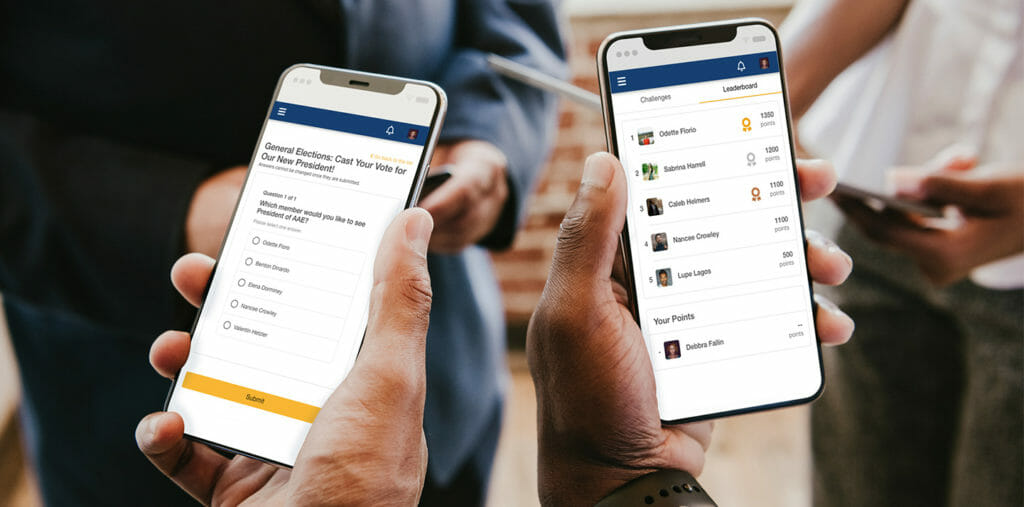Post Event Survey Questions and Best Practices
The big event is over, and your attendees have logged off or gone home. Take a deep breath and pat yourself on the back, but your job isn’t quite over—now it’s time to get feedback.

Asking the right post event survey questions can help you figure out what worked well during the event and what you need to tweak and improve for your next one.
- But what do you ask?
- Whom do you ask?
- And how do you get people to actually answer your post event survey questions?
We’ll answer all that in this article.
Who should you ask for feedback?
1. Attendees
This should come as no surprise—the most important people to survey are the attendees themselves. After all, this whole event was for them! If they had a positive experience at your event, they will be more likely to remain engaged within your event community, return for the next event, and act as an advocate to promote your event to their peers. If attendee needs weren’t satisfied, they will be looking for a way to voice their opinions. Getting their input in a formal way will allow them to provide genuine feedback that will not only allow them to vent, but also provide you with valuable insights into how to improve your next event experience. It also gives you the opportunity to provide a response to any negative experiences and inform them of how the event will be improved in the future.
2. Event Volunteers/Staff
The first go-to group to ask for feedback is your attendees, but there’s another important group that can give you guidance on designing a better event experience: the people who organized and ran your event! Event volunteers and staff are a great resource to learn about what worked and how things could be improved for the next time.
Whether it’s assisting with event registration, managing speakers and live footage, or providing help with directions throughout the venue, volunteers have access to behind-the-scenes machinations and in-the-moment feedback from attendees. Your volunteers and event staff have valuable insight into how to improve processes at your next event, and what aspects of the event were making waves among attendees.

You may want to create a set of post event survey questions for volunteers like you would with attendees. Alternatively, you could send a more casual email expressing your thanks and asking if they have any feedback they’d like to share.
3. Event Sponsors
Event sponsors are vital to your event’s success, as they help generate funds to make the whole thing profitable. Their feedback can help you determine whether they felt the event was worth their investment, and give you guidance on how to attract the same or new sponsors for your next event.
If you only have a few sponsors, getting feedback from them can be done with a simple email or phone call. However, if you have many sponsors, generating a few specific a post event survey questions would be more efficient in following-up. Additionally, this method provides the benefit of anonymity to your sponsors.
Looking for detailed advice on designing an event sponsorship package that will be competitive in today’s market?
Creating your post event survey goals
Before you send out a survey to your target audiences, it’s crucial that you first understand what your goals are. This way, you’ll be able to craft post event survey questions that will actually provide value and enable you to measure your success.
Feedback seeks to answer:
- What worked?
- What didn’t work?
- Why?
Questions should address:
- Event highlights -These are the “favorites.” What were the biggest successes of your event that got attendees excited?
- Ways to improve event management – These are the “least favorites.” This is where you’ll find the real nuggets of gold because you can learn and improve to get the most long-term success in your event management
- Measuring overall event satisfaction – Every event will have positive and negative elements. Each guest will have their own unique take since the event experience is so subjective
- Surprises and the unknown. As the event organizer, you can’t possibly know everything your attendees are thinking after the event has come to a close. Your post event survey questions should help respondents open up about anything on their minds, helping you identify wins and areas for improvements that weren’t on your radar.
How to craft compelling post event survey questions
When sending out a survey, you want to get as many responses as possible, so it’s important that the questions you choose are compelling and that the surveys are easy to complete.
Include post event survey questions that give numerical results, so they can be measured objectively. For example, ask attendees to gauge their satisfaction on a scale of one to five, or ask them to rate how likely they are to recommend the event to a friend.

There are many cheap (or even free) survey software providers that enable you to write, distribute, and review your survey questions. However, if you are using an event app, you can provide easy and immediate access for attendees by including the survey directly within the same digital space they used throughout the event. This will get you the highest response rate, because the experience is still fresh in their minds.
There are three main types of questions used in post event surveys:
- Open-ended questions
- Rating questions
- Multiple-choice questions
Open-ended questions
Open-ended questions are a great way to get in-depth knowledge of an attendee’s experience, because respondents can answer in their own words. However, be careful to not ask too many open-ended questions, because they’re difficult to tabulate and quantify. Additionally, open-ended questions typically take a little more time to answer, which may drive some respondents away.
Examples of questions:
- What did you like most about the event?
- What would you like to see improved for next year’s event?
- Were there any parts of the event that you found particularly useful?
- What was your least favorite part of this event?
- Will this event help further your career/your team’s goals/your company’s ROI? If so, how?
- Do you have any topic or speaker suggestions for future events?
Rating questions
Rating questions make use of scales as a way for your respondents to provide feedback. For example, you could ask, “On a scale from 1 to 5, how satisfied are you with this event?” The ranking is usually done on a numerical scale, such as from 1-to-5, or two anchoring points that are opposite views, such as “Strongly Agree” and “Strongly Disagree.”
Examples of questions:
On a scale from 1 to 5, with one being low and five being high:
- How would you rate the quality of each speaker?
- How likely are you to recommend this conference to a friend or coworker?
- How likely are you to attend this event again next year?
- How would you rate the value of this conference?
- How satisfied were you with the event’s agenda?
- How would you rate your overall experience?
- How would you rate the quality of the networking at this event?
You can also create a matrix, or a grid, to ask participants to rate multiple factors within the same question. For example, you might ask people the same questions about different sessions they attended, or dedicate a section of the survey to the technology you used at the event.
Multiple-choice questions
These are questions where you give attendees a choice between specific responses. It could be multiple-choice, where they select the best-fitting answer, or “choose all that apply,” where they select all relevant boxes.
Examples of questions:
- How did you first hear about the conference?
- Have you attended this conference before?
- Which of these sessions did you attend?
- What factors determine your decision to attend conferences and other professional development?
- Which speakers did you enjoy?
- Did you participate in any of the after-conference activities?
- Did you have enough time for Q&A at the end of each presentation?

Related Resources
Best Practices for Evaluating Event Success
Feedback Gathering at Events
How to Avoid Sending out the Worst Event Survey Ever